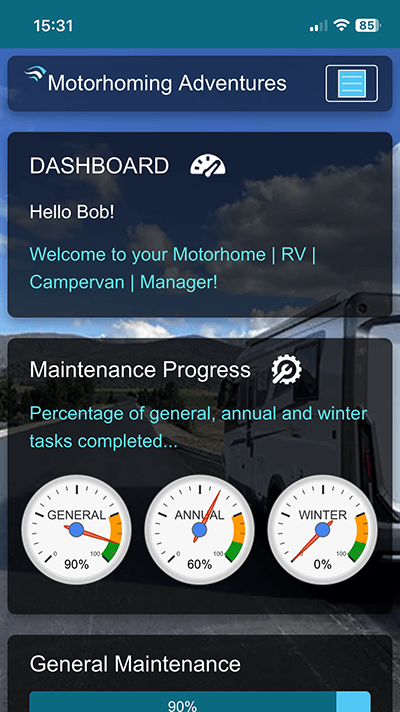Off-Grid in a Motorhome
Guide to Staying Off-Grid in a Motorhome or Campervan
Off-grid parking means no mains electricity, no guaranteed fresh water supply and no waste disposal services.
You park in lay-bys, aires, remote car parks or other quiet spots and run everything from equipment you bring or have installed in the vehicle.
The aim is to be independent, low-impact and prepared for limited facilities.
Power for Staying Off-Grid
Power for off-grid motorhoming is about three things: producing energy (usually solar panels), storing energy (the battery bank), and converting energy (an inverter to run normal 240V appliances from your 12V system).
Instead of focusing on technical numbers, think in terms of capacity and usage: a small setup covers basic lighting, phone charging and a fridge; a larger setup gives you more headroom for kettles, induction hobs or longer appliance use.
Good system components include efficient solar panels, a smart charge controller that maximises solar yield, an appropriately sized battery bank that can store enough energy for overnight and cloudy periods, and a quality pure-sine inverter if you want to run mains appliances safely.
Types of Practical Solar Setups
There are two common practical approaches: a higher-capacity installed system for larger motorhomes and full-time living, and a compact system for weekenders or smaller vans.
The higher-capacity approach uses multiple roof panels, a sizeable battery bank and more advanced monitoring and charging devices to support heavier loads and longer stays.
The compact approach uses fewer panels, a smaller battery and a smaller inverter, prioritising portability and low weight for short trips.
Both use the same basic components but differ in scale and how much power they can reliably supply.
How To Match Power to Your Needs
To decide which approach suits you, list the appliances you plan to run and when you will run them.
If you expect to boil kettles and cook using an electric hob often, you will need greater storage and charging capacity.
If you mainly need lighting, a fridge, phone and occasional laptop charging, a smaller, simpler system will be fine.
Always plan for worst-case days with less sun and consider backup charging options such as engine alternator charging or a small generator where allowed.
Off-Grid Parking Essentials: Power
Essential power items include a charged leisure battery or battery bank, a solar panel setup that matches your roof space or portable needs, a charge controller to regulate charging, and an inverter if you want to use mains-style appliances.
Accessories to consider are a battery monitor to track state of charge, USB and 12V charging options, a power bank for phones, reliable lighting such as head torches and lanterns, and a backup charging option such as an alternator-to-battery charger or a small generator if permitted.
Off-Grid Parking Essentials: Water and Waste
Water and waste items are vital when there are no site facilities. Ensure your fresh water tank is topped up before arrival and bring spare water containers.
Carry a drinking-water filter or purification option, and use biodegradable toiletries.
For toilets, a cassette toilet with eco chemicals and a plan for emptying or a spare cassette or disposal bag is essential.
Always keep your grey water tank empty before heading out and be ready to collect wastewater in a tub if you cannot dispose of it immediately.
Off-Grid Parking Essentials: Comfort
Thermal screens or blinds retain heat and privacy, levelling ramps make uneven sites usable, and appropriate bedding keeps you warm.
Consider ventilation options such as roof vents or window clips, and pack compact outdoor furniture.
Use low-power heating and fans as appropriate and keep privacy screens or awnings for discreet use where allowed.
Off-Grid Parking Essentials: Cooking and Food
Cooking off-grid usually prioritises gas or low-power options. Carry full gas cylinders for hob and heating where possible, and bring a backup like a portable stove or mini barbecue.
Plan simple one-pot meals and carry non-perishable staples.
Use a coolbox or a small 12V fridge and efficient washing-up gear to conserve water.
Take waste bags and plan to pack out all rubbish and recyclables.
Off-Grid Parking Essentials: Safety and Navigation
Always carry a first aid kit, appropriate visibility gear and a breakdown triangle if travelling abroad.
Fit carbon monoxide and smoke alarms, and have a small fire extinguisher and blanket.
Use offline navigation apps and have paper maps as a backup.
Keep a reliable torch and a charged phone with backup charging options.
Useful Apps and Tools
Apps and tools make finding and managing wild spots easier. Use an offline weather app and a mapping app with offline capability.
Our motorhome manager app which includes an off-grid checklist is valuable for managing day-to-day operations and maintenance.
Optional Extras That Make Off-Grid Easier
Optional extras that improve comfort include a portable toilet tent, a laundry line for longer trips, an outdoor mat to keep mud out, entertainment downloads, and pet supplies.
Temperature and gas level sensors that integrate with a system monitor can give peace of mind, and Bluetooth or app control for monitoring can simplify day-to-day checks.
Practical Tips for Responsible Wild Camping
Follow local rules and the spirit of leave-no-trace.
In Scotland, wild camping is widely permitted when done responsibly.
In most of England and Wales it is not generally permitted without permission, so seek responsible parking.
Be considerate of neighbours and wildlife.
Managing Power Usage Off-Grid
Monitor power use and prioritise essential services.
Run high-draw items during daylight when panels produce most energy, use LEDs and low-draw devices, and avoid running multiple heavy appliances at once.
Keep your battery monitor visible so you can react before batteries are critically low and have a contingency for charging if conditions are poor for several days.
For iPhone
Our App is available for iPhone, desktop and android. For iPhone and desktop get it here...
For Android
Our App is avaiable for iPhone, desktop and android. For Android get it on Google Play...
